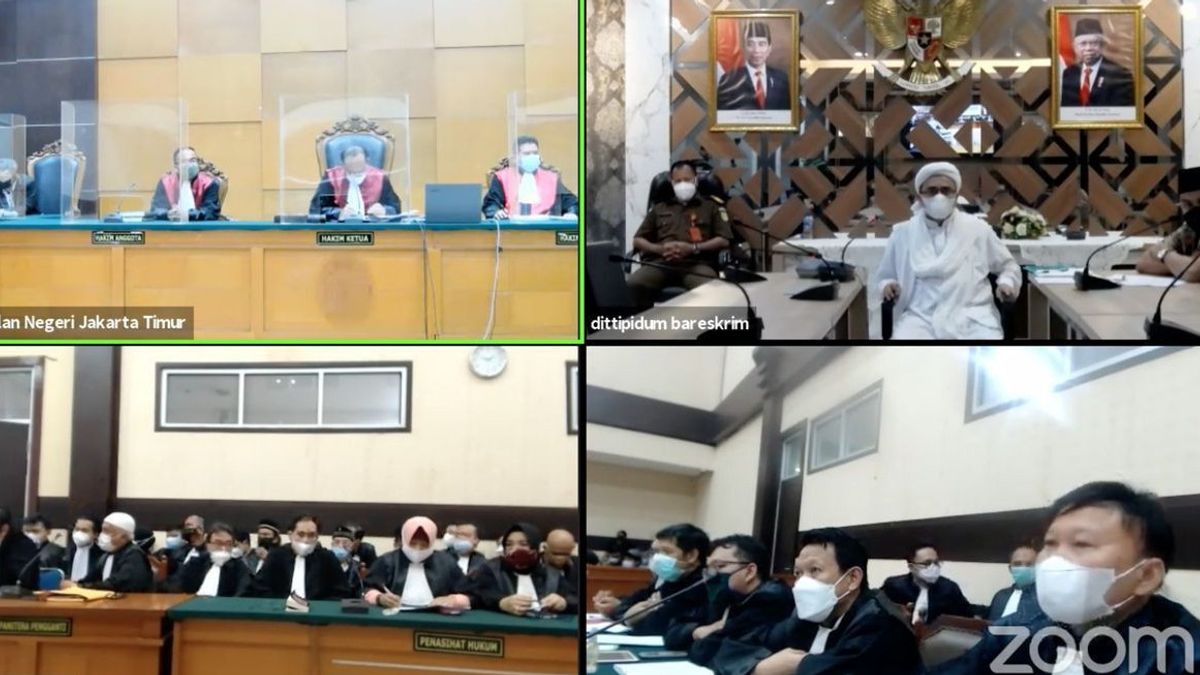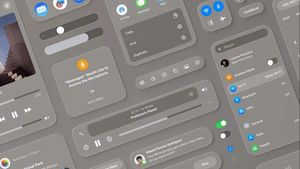JAKARTA - The team of attorneys and Rizieq Shihab walked out of the online trial agenda which was held at the East Jakarta District Court (PN). The reason is because he asked to be presented in the courtroom.
"Sorry, sorry, because I have been jailed for 3 months. I want this trial to be fair. I want to get my rights and my freedom to attend the trial," Rizieq said at the trial, Tuesday, March 16.
Regarding the COVID-19 problem, Rizieq admitted that he could follow the applicable health protocol rules. Therefore, there was no reason for the judge to refuse to attend. After all, the prosecutor was present and his team of lawyers was allowed to come to the East Jakarta District Court.
"When it comes to the problem of COVID, we have a health program that we can follow and I see a large number of legal advisors and public prosecutors, they can be presented and can be present in the courtroom, why can't I be presented alone in the courtroom," Rizieq explained. .
The panel of judges then explained that the basis for making virtual court decisions was not based on any technical problems. Hearing the answer, dozens of Rizieq Shihab's lawyers came out.
"We will not take part in the online trial. I will walk out. The trial is with a wall," said lawyer Rizieq Shihab.
Legal Basis of Online SessionIn fact, the COVID-19 pandemic has prompted law enforcement agencies to agree to hold hearings online. Initially, this rule was contained in SEMA No. 1 of 2020 concerning Guidelines for Implementing Tasks During the Prevention Period of the Spread of Covid-19 in the Supreme Court and the Judiciary Bodies below.
A moment later, the Supreme Court (MA) issued Supreme Court Regulation No. 4 of 2020 concerning the Administration and Trial of Criminal Cases in an Electronic Court (Perma Sidang Pidana Online). This Perma regulates the procedures and implementation of trials within the scope of general, military, and jinayat courts online.
For the implementation of trials via teleconference to protect suspects / defendants from the threat of the spread of COVID-19. The Supreme Court entered into a cooperation agreement with the Attorney General's Office and the Ministry of Law and Human Rights in April 2020.
Following the agreement, courts, prosecutors and detention centers quickly adapted by holding online trials via teleconference. Both since the beginning of the trial and at the time the trial has been running at the request of the public prosecutor, the defendant, or a legal advisor and a judge / panel of judges has been appointed.
In principle, the judge / panel of judges, the substitute clerk, the prosecutor shall convene in the courtroom. Meanwhile the defendant attended the trial from the detention center where the defendant was detained accompanied / without being accompanied by a legal advisor.
"Or a judge / panel of judges, a substitute clerk of the court hears in the courtroom, while the public prosecutor attends a trial from the public prosecutor's office, the defendant is accompanied / without his legal advisor accompanying the trial from the detention center where the defendant is being held," wrote the Supreme Court.
Article 2 paragraph (3) Perma also regulates the technicality of online trials electronically, is a courtroom in the court which includes the prosecutor's office, detention center / prison or other places determined by the panel of judges, provided that all session participants must be seen on the monitor screen with a bright and clear voice. clear.
To participate in online trials, panels of judges, prosecutors, defendants, witnesses and legal advisors use their respective trial attributes according to the provisions of the applicable procedural law. Meanwhile, administrative documents are submitted electronically by means of a court information system stored and managed.
"Even though the judge did not directly meet the defendant, witnesses or experts, the statements given by the parties in the electronic trial were confirmed to have the same evidentiary value."
Furthermore, the examination of evidence is carried out online because it remains at the public prosecutor's office, except for printed documents that can be scanned. As for evidence other than printed documents, the panel of judges will receive photos or videos of the evidence.
For criminal charges, the defense, replication and duplication are read out in front of the court in accordance with the provisions of the procedural law. Likewise with decisions that are read out electronically.
The English, Chinese, Japanese, Arabic, and French versions are automatically generated by the AI. So there may still be inaccuracies in translating, please always see Indonesian as our main language. (system supported by DigitalSiber.id)











